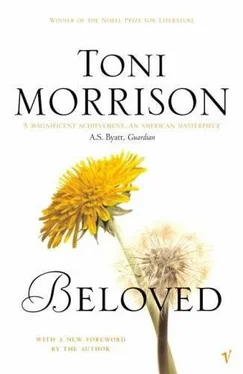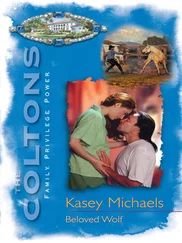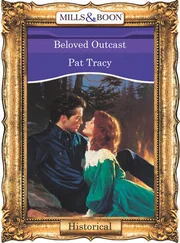"Well?"
"Well, what?"
"Saturday coming. You going to Call or what?"
"If I call them and they come, what on earth I'm going to say?"
"Say the Word!" He checked his shout too late. Two whitemen burning leaves turned their heads in his direction. Bending low he whispered into her ear, "The Word. The Word."
"That's one other thing took away from me," she said, and that was when he exhorted her, pleaded with her not to quit, no matter what. The Word had been given to her and she had to speak it.
Had to.
They had reached the twin chestnuts and the white house that stood behind them.
"See what I mean?" he said. "Big trees like that, both of em together ain't got the leaves of a young birch."
"I see what you mean," she said, but she peered instead at the white house.
"You got to do it," he said. "You got to. Can't nobody Call like you. You have to be there."
"What I have to do is get in my bed and lay down. I want to fix on something harmless in this world."
"What world you talking about? Ain't nothing harmless down here."
"Yes it is. Blue. That don't hurt nobody. Yellow neither."
"You getting in the bed to think about yellow?"
"I likes yellow."
"Then what? When you get through with blue and yellow, then what?"
"Can't say. It's something can't be planned."
"You blaming God," he said. "That's what you doing."
"No, Stamp. I ain't."
"You saying the whitefolks won? That what you saying?"
"I'm saying they came in my yard."
"You saying nothing counts."
"I'm saying they came in my yard."
"Sethe's the one did it."
"And if she hadn't?"
"You saying God give up? Nothing left for us but pour out our own blood?"
"I'm saying they came in my yard."
"You punishing Him, ain't you."
"Not like He punish me."
"You can't do that, Baby. It ain't right."
"Was a time I knew what that was."
"You still know."
"What I know is what I see: a nigger woman hauling shoes."
"Aw, Baby." He licked his lips searching with his tongue for the words that would turn her around, lighten her load. "We have to be steady. 'These things too will pass.' What you looking for? A miracle?"
"No," she said. "I'm looking for what I was put here to look for: the back door," and skipped right to it. They didn't let her in.
They took the shoes from her as she stood on the steps and she rested her hip on the railing while the whitewoman went looking for the dime.
Stamp Paid rearranged his way. Too angry to walk her home and listen to more, he watched her for a moment and turned to go before the alert white face at the window next door had come to any conclusion.
Trying to get to 124 for the second time now, he regretted that conversation: the high tone he took; his refusal to see the effect of marrow weariness in a woman he believed was a mountain. Now, too late, he understood her. The heart that pumped out love, the mouth that spoke the Word, didn't count. They came in her yard anyway and she could not approve or condemn Sethe's rough choice.
One or the other might have saved her, but beaten up by the claims of both, she went to bed. The whitefolks had tired her out at last.
And him. Eighteen seventy-four and whitefolks were still on the loose. Whole towns wiped clean of Negroes; eighty-seven lynchings in one year alone in Kentucky; four colored schools burned to the ground; grown men whipped like children; children whipped like adults; black women raped by the crew; property taken, necks broken.
He smelled skin, skin and hot blood. The skin was one thing, but human blood cooked in a lynch fire was a whole other thing.
The stench stank. Stank up off the pages of the North Star, out of the mouths of witnesses, etched in crooked handwriting in letters delivered by hand. Detailed in documents and petitions full of whereas and presented to any legal body who'd read it, it stank. But none of that had worn out his marrow. None of that. It was the ribbon. Tying his flatbed up on the bank of the Licking River, securing it the best he could, he caught sight of something red on its bottom. Reaching for it, he thought it was a cardinal feather stuck to his boat. He tugged and what came loose in his hand was a red ribbon knotted around a curl of wet woolly hair, clinging still to its bit of scalp. He untied the ribbon and put it in his pocket, dropped the curl in the weeds. On the way home, he stopped, short of breath and dizzy. He waited until the spell passed before continuing on his way. A moment later, his breath left him again. This time he sat down by a fence.
Rested, he got to his feet, but before he took a step he turned to look back down the road he was traveling and said, to its frozen mud and the river beyond, "What are these people? You tell me, Jesus. What are they?"
When he got to his house he was too tired to eat the food his sister and nephews had prepared. He sat on the porch in the cold till way past dark and went to his bed only because his sister's voice calling him was getting nervous. He kept the ribbon; the skin smell nagged him, and his weakened marrow made him dwell on Baby Suggs' wish to consider what in the world was harmless. He hoped she stuck to blue, yellow, maybe green, and never fixed on red.
Mistaking her, upbraiding her, owing her, now he needed to let her know he knew, and to get right with her and her kin. So, in spite of his exhausted marrow, he kept on through the voices and tried once more to knock at the door of 124. This time, although he couldn't cipher but one word, he believed he knew who spoke them.
The people of the broken necks, of fire-cooked blood and black girls who had lost their ribbons.
What a roaring.
Sethe had gone to bed smiling, eager to lie down and unravel the proof for the conclusion she had already leapt to. Fondle the day and circumstances of Beloved's arrival and the meaning of that kiss in the Clearing. She slept instead and woke, still smiling, to a snow bright morning, cold enough to see her breath. She lingered a moment to collect the courage to throw off the blankets and hit a chilly floor.
For the first time, she was going to be late for work.
Downstairs she saw the girls sleeping where she'd left them, but back to back now, each wrapped tight in blankets, breathing into their pillows. The pair and a half of skates were lying by the front door, the stockings hung on a nail behind the cooking stove to dry had not.
Sethe looked at Beloved's face and smiled.
Quietly, carefully she stepped around her to wake the fire. First a bit of paper, then a little kindlin-not too much-just a taste until it was strong enough for more. She fed its dance until it was wild and fast. When she went outside to collect more wood from the shed, she did not notice the man's frozen footprints. She crunched around to the back, to the cord piled high with snow. After scraping it clean, she filled her arms with as much dry wood as she could. She even looked straight at the shed, smiling, smiling at the things she would not have to remember now. Thinking, "She ain't even mad with me.
Not a bit."
Obviously the hand-holding shadows she had seen on the road were not Paul D, Denver and herself, but "us three." The three holding on to each other skating the night before; the three sipping flavored milk. And since that was so-if her daughter could come back home from the timeless place-certainly her sons could, and would, come back from wherever they had gone to.
Sethe covered her front teeth with her tongue against the cold.
Hunched forward by the burden in her arms, she walked back around the house to the porch-not once noticing the frozen tracks she stepped in.
Inside, the girls were still sleeping, although they had changed positions while she was gone, both drawn to the fire. Dumping the armload into the woodbox made them stir but not wake. Sethe started the cooking stove as quietly as she could, reluctant to wake the sisters, happy to have them asleep at her feet while she made breakfast. Too bad she would be late for work--too, too bad. Once in sixteen years?
Читать дальше











